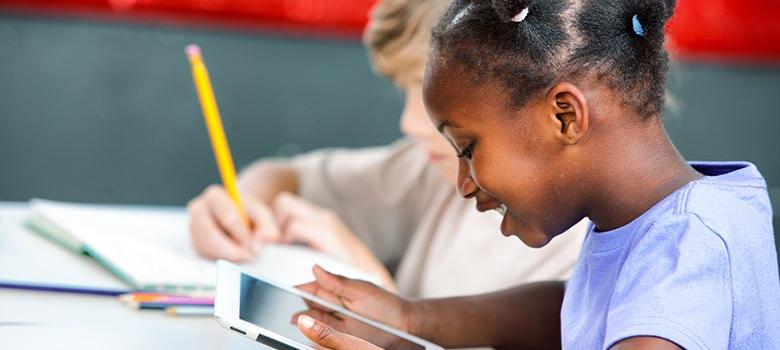The Apple and ConnectED Initiative was launched in 2014 and coupled 1:1 iPad access with comprehensive support in a diverse set of 114 schools. The project sought to catalyze transformed learning opportunities for students in historically underserved communities across America. To be eligible to apply, 96% or more of each school’s students had to qualify for free or reduced-price meals. The initiative thus offered a unique opportunity to study technology adoption across a wide range of traditionally under-resourced settings.
The six-year independent research study conducted by SRI International across 101 schools aimed to combine rigorous measurement of ConnectED’s outcomes and accomplishments with an in-depth look at what it has meant for participating teachers, students, principals, and parents. Research methods included principal, teacher, and student surveys and site visits as well as analyses of student achievement data and teacher-submitted lessons and student work. Reporting focused on the early implementation of ConnectED, lessons learned about bridging digital use and access divides, and key factors that support sustainability.
Access to new technologies such as an iPad® for students and teachers is often seen as a path toward transformed educational opportunities. Yet, there are still many open questions about the real nature of the opportunity afforded by technology and the support required to actualize these goals, particularly in school and community settings that have historically been marginalized from high-quality education.
To shed light on these questions, researchers at SRI International, in collaboration with researchers at Digital Promise®, conducted a rigorous, six-year, mixed-method study of the implementation and outcomes of the Apple and ConnectED initiative. Starting in 2014, the initiative provided both technology and comprehensive support that included planning, professional learning, and ongoing guidance for school leaders and teachers in 114 schools across the nation with 96% or more of their students qualifying for free and reduced-price meals. The goal was to promote more personalized and student-centered learning experiences that support improved outcomes for students in learning and in life, for students in historically underserved settings.
The research included
- Surveys of teachers, principals, and students
- School case studies
- Collections of sample lessons and student work
- A study of student achievement outcomes
The study was situated in the diverse set of community settings served by the initiative, ranging from the inner city to native American communities and to migrant populations on the Mexican border. This range of methods was designed to paint a rich picture of participants’ experiences and outcomes as they integrated new technology tools into teaching and learning, and to capture experiences over time as the initiative matured.
Reports from this study summarize evaluation results from a number of perspectives. Together the reports provide an in-depth description of early changes in the classroom learning environment that were commonly observed in these iPad classrooms; lessons learned from the initiative about what it takes to bridge digital divides, considering both digital access and digital use; factors that contribute to the sustainability of 1:1 integration in historically underserved contexts; and case stories of implementation from several of the schools. A separate report summarizes the methods used across this research.
- The Apple and ConnectED Initiative: Research Study Methods
- The Apple and ConnectED Initiative: Baseline and Year 2 Findings from Principal, Teacher, and Student Surveys
- 1:1 Teaching and Learning in the Apple and ConnectED Initiative: Lessons from Early Implementation
- Bridging the Digital Access and Use Divides in the Apple and ConnectED Initiative
- Maintaining Momentum of 1:1 Programs: Observations from the Apple and ConnectED Initiative
- The Apple and ConnectED Initiative: Three Case Stories
In addition to reporting, two research tools based on project methods are available for broader use. A section of the Apple and ConnectED teacher survey that operationalizes constructs of classroom practice related to deeper learning is available at, ConnectED Research Teacher Survey – Spring 2017 Teaching and Learning Excerpts, under a Creative Commons license for non-commercial use (CC BY-NC 4.0). In addition, the rubrics developed on this project to look at instructional artifacts through the lens of deeper learning have been adapted into a resource for teachers, offering concrete ideas for incorporating this type of learning in their lessons. This resource is available as part of Apple’s online suite of leadership resources.
For further reading about the Apple and ConnectED Initiative, reports are available from two research organizations that each conducted an independent study of the initiative through the lens of a specific population. The reports focus on schools that serve early childhood learners (Education Development Center) and technology access in urban communities (The Brookings Institution).
Associated SRI team members
-

Linda Shear
Director of Commercial and International Strategy, SRI Education
-

Sarah Nixon Gerard
Senior Researcher, SRI Education
-

Rebecca J. Griffiths
Principal Researcher, SRI Education
-

Jessica L. Mislevy
Director of Digital Learning & Technology Policy, SRI Education
-

Haiwen Wang
Senior Principal Education Researcher and Evaluation Methods Lead



